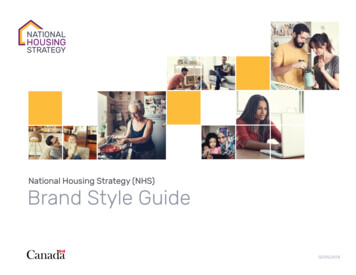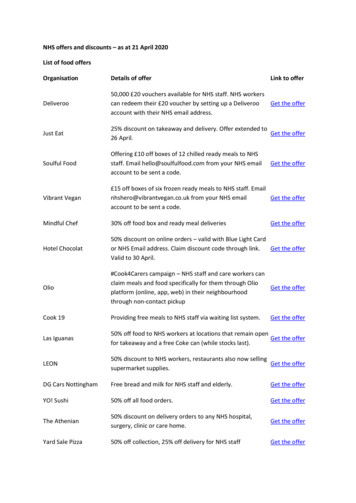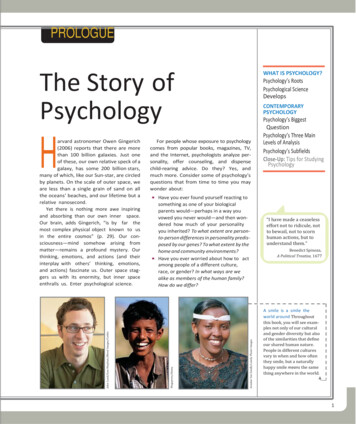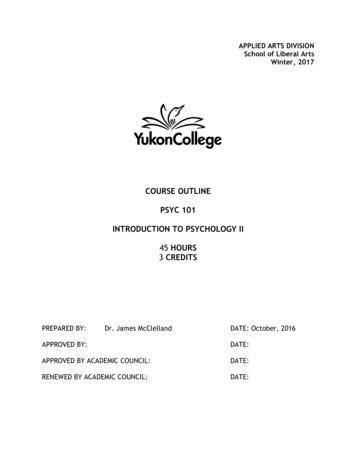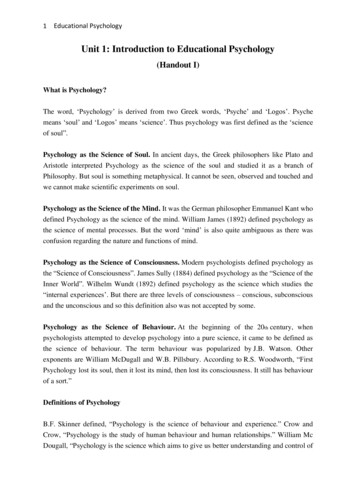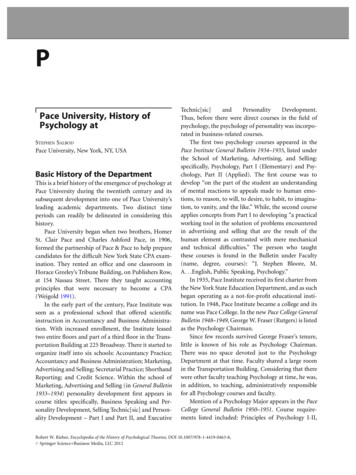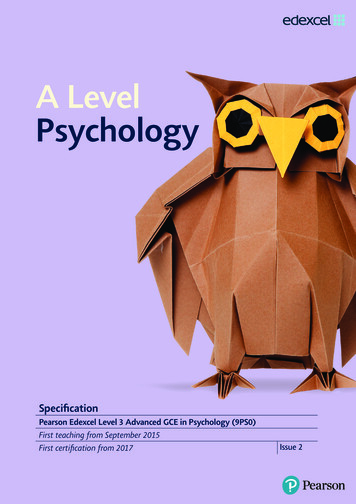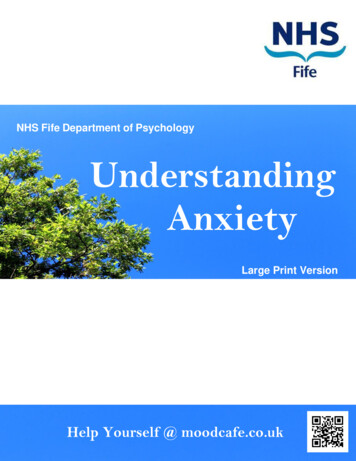
Transcription
NHS Fife Department of PsychologyUnderstandingAnxietyLarge Print VersionHelp Yourself @ moodcafe.co.uk
NHS Fife Psychology DepartmentMay 2014What is anxiety?Anxiety is not an illness that you either have or do not have everyone has experienced anxiety.We can all remember stressful times when we have feltanxious, like going for job interview or going to the dentist. Thatis perfectly normal. But anxiety is a problem when:-It is experienced frequently or-If it occurs in situations that should not really be stressful.When someone is anxious, they experience physical feelings andworrying thoughts. This can make it hard to do even simple tasksand so they begin to avoid things. Often theperson does notunderstand why they feel as they do. Whenthey are relaxedthey can see that their worries are over thetop, but when theanxiety builds up they feel overwhelmed once again.2
NHS Fife Psychology DepartmentMay 2014The effects of anxietyAnxiety affects: how we think, what we do and how our body reacts.1. How we thinkWhen anxiety is out of control, people describe havingthoughts such as: These thoughts flash automatically intotheir heads when they are anxious.Two things should be remembered about automatic thoughts:i.They are irrational and unrealistic – you will not die or go madii.They end up making you feel more anxious – if you think thatyou are not going to cope, you will worry even more.Learning to control such thoughts can help you to handle youranxiety.2. What we doPeople suffering from anxiety often avoid things, e.g. going outalone or chatting to people. They usually do this because theythink that they will cope badly, e.g. they will panic or make a fool ofthemselves. By avoiding the situation, they feel better. But in thelong term avoidance always makes the problem worse. This isbecause more and more anxiety gets associated with the avoided3
NHS Fife Psychology DepartmentMay 2014thing and so it gets harder and harder to face up to it.Anxiety can also make people feel that they must do certain thingse.g. they might start repeatedly checking to see if doors are lockedor plugs pulled out, or they might clean the house much more than itneeds. Anxiety can also lead to other behaviours such as talking toofast or mixing up words. Being aware of these behaviours can makeyou feel more anxious.3. How out bodies reactThere are many physical symptoms of anxiety – such as heartthumping, shaking, sweating, dizziness, breathing difficulties,muscle pain, tiredness, upset stomachs and headaches. Thesymptoms are very unpleasant and sometimes seem to appear forno reason. People worry that they have a serious physicalproblem or that something terrible is going to happen. It isimportant to know that these symptoms are not dangerous and willnot do any damage to you even if they are severe.What causes anxiety?1. Our lives and personalitiesSome people have had difficult experiences earlier in life and thiscan make them more likely to get anxious. Other people havealways been “the worrying type”. For many4
NHS Fife Psychology DepartmentMay 2014people, anxiety problems begin following a time of stress. E.g.they have difficulties at work or in a relationship, have beenbereaved, are in poor health or have money worries. Stress cancause physical changes in the body and make it more likely thatanxiety begins.2. The body’s reaction to stress – the fight/flight responseIn the past our ancestors needed to cope quickly with danger e.g.from wild animals or enemy attack. We still need to cope withdanger e.g. to get out of the way of a speeding car. In suchsituations the body goes “on the alert” ready for action (e.g. heartgoes faster and we breathe quicker). But we can also react in thesame way to things that worry us, like being criticised. Whensomeone is finding a lot of things worrying, then the body gets intothe habit of being “on alert” and physical symptoms of anxietydevelop.3
NHS Fife Psychology DepartmentMay 2014What keeps anxiety going?You may first notice anxiety in yourthoughts, behaviour or body. But youranxiety reaction in each area feeds intothe others. This keeps the body “onalert” and creates a vicious circle thatkeeps the anxiety going.Anxiety ConditionsSometimes the effects of anxiety are experienced in a specific wayand are recognised as a particular anxiety condition. The mostcommon anxiety conditions are:-Free floating or generalised anxiety-Panic attacks-Phobias including agoraphobia, social phobia, animal phobias andclaustrophobia-Obsessive-compulsive reactions4
NHS Fife Psychology Department-May 2014Post traumatic stress disorderPeople suffering from anxiety will often also experiencefeelings and symptoms of depression.Other leaflets, describing the above conditions, are available onmoodcafé.Overcoming anxiety problemsYou can learn to manage your anxiety so that it stops being aproblem. There are many ways that you can start to tackle anxiety.Books that can helpOvercoming Anxiety by H KennerleyOvercoming Loneliness and Making Friends by M CsotiOvercoming Panic by D SiloveOvercoming Panic, Anxiety & Phobias New Strategies toFree Yourself from Worry and Fear by C Goldman & SBabiorOvercoming Social Anxiety and Shyness by G ButlerThese books are also available through the fife book prescriptionscheme. More information is available at moodcafé lp leaflets/courses5
NHS Fife Psychology DepartmentMay 2014Living Life is a free telephone service that offers guided self-help.More information is available on the NHS 24 website www.nhs24.com/UsefulResources/LivingLife There are leafletsthat cover other types of anxiety disorders on moodcafé –www.moodcafe.co.uk.Some organisations offer self-help courses to help individuals totackle their anxiety: Panic Attacks - www.panic-attacks.co.uk.6
NHS Fife Psychology DepartmentMay 2014RelaxationRelaxation can help relieve and prevent anxiety.Relaxation exercises are available to download on moodcafé spx.A free relaxation CD and booklet are available from Steps for Stress www.stepsforstress.org.Organisations that can helpThere are lots of organisations out there that can help. Somehave helplines that you can contact to have a chat about youranxiety.Anxiety UK - www.anxietyuk.org.uk, helpline – 08444 775 774 (MonFri 9:30am-5:30pm) No more panic - www.nomorepanic.co.uk.Includes a forum where you can chat to people who are havingsimilar problems.For more national helplines and organisations check our moodcafé plines-andgroups-in-fife.aspx.How to access further helpIf you find your anxiety is getting worse, or think you might needfurther help with your anxiety problems, speak to your GP.7
Visit moodcafe.co.ukfor more helpful resources
Books that can help Overcoming Anxiety by H Kennerley Overcoming Loneliness and Making Friends by M Csoti Overcoming Panic by D Silove Overcoming Panic, Anxiety & Phobias New Strategies to Free Yourself from Worry and Fear by C Goldman & S Babior Overcoming Social Anxiety and Shyness by G Butler These
